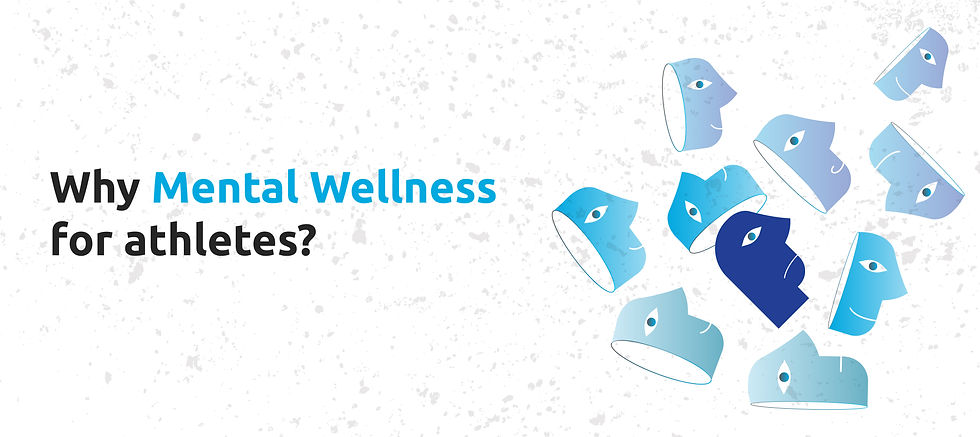Why Mental Wellness for Athletes?
- Sep 23, 2021
- 3 min read
Updated: Nov 17, 2021

Mental ill-health is a potential pitfall for all athletes and coaches during their sporting journeys! The past couple of years have witnessed shocking revelations of mental illnesses by top sportspersons, as well as a spike in the number of athletes displaying mental ill-health symptoms. Rigours of Talent Identification, in terms of too-early or too-late; the blow of being weeded-out; outcome achievement orientation; objectification of athletes for performance outcomes; win-at-all-cost attitudes; athlete commitments due to entrapment rather than enjoyment; lack of athlete mental health awareness from self and others; etc, can lead to athletes living robotic lives and rendering themselves medal-making machines to feed the sports ecosystem’s never satiating hunger for glory. Mental health of athletes has been a largely neglected area of care and concern despite the known fact that athletic journeys can be traumatic due to the rigours of training and competitions. One in every four-to-five young people aged between 16–24 experiences a mental disorder (Cannon, Coughlan, Clarke, Harley, & Kelleher, 2013; Kessler et al., 2007). Athletes experience mental ill-health such as anxiety, depression, post-traumatic stress, sleep disorders etc (Rice et al., 2019; Gouttebarge et al., 2019 ) because of considerable overlap in the years of active elite competition and the primary ages of onset for most mental disorders (Allen & Hopkins, 2015; Kessler, Berglund, Demler, Jin, Merikangas, & Walters, 2005; Rice, Purcell, De Silva, Mawren, McGorry, & Parker, 2016).
Coach mental well-being is a largely ignored aspect too. Research findings have shed light on the negative impact of experiences through coaching journeys on coach well-being (Didymus, 2017; Fletcher, & Scott, 2010; Norris, Didymus, & Kaiseler,2017; Olusoga, Butt, Hays, & Maynard, 2009). Creating a positive learning experience that promotes the development of athletes’ life skills, especially at the developmental level of sports participation is one of the many responsibilities of a coach (Camiré, Trudel, & Forneris, 2012). Basically, providing a psychologically safe environment for the athlete is key to unleash their best potential and promote holistic well-being. However, a compromised coach's mental health can retard this responsibility. As coaches have a direct influence on athletes’ participation (Ortín, Maestre, & García-de-Alcaraz, 2016), a coach-athlete relationship can influence the athlete's motivation in sport (Duda & Balaguer, 2007). Therefore, it is imperative that coaches are mentally healthy and possess the skills to support mental health athletes (Mazzer & Rickwood, 2015).
This calls for the sports ecosystem to be humane towards athletes and coaches, keep athletes and coaches centre stage, and promote athlete and coach welfare beyond sports performances. There is a need for truly athlete-centric, coach-led systems where athletes are treated with human dignity first. When all athletes are holistically healthy and happy giving their best performances, they also exit the system healthy and happy; and give back the same feelings to the next generations. On the same breath, there is also a need to create a sporting world, where coaches are treated with human dignity first, where they are holistically healthy and happy in facilitating the best potential of athletes and give back the same feeling to the athletes which can impact athlete mental wellbeing positively.
Mental Wellness is a step before performance psychology and leads to wellbeing and peak performance. The Indian Sporting Ecosystem needs a revolution in its approach to Mental Wellness, in order to help athletes and coaches meet the challenges of High-Performance Sport. The ABF Athlete & Coach Mental Wellness initiative celebrates athletes & coaches as humans first. To this end, our mission is to create awareness of the challenges and the importance of Mental Wellness, its impact on High Performance and holistic well-being, facilitate empowerment, and foster an attitude-shift of the sports ecosystem towards athlete and coach mental wellness. The ABF Athlete and Coach Mental Wellness Program is geared at educating and empowering athletes and coaches, as well as the entire sports ecosystems, towards their mental well-being. Key conversations in our program include: Psychological safety from the sports ecosystem that lends support in creating a sporting world, where athletes and coaches are treated with human dignity first; Self-awareness on the merit of living holistic lives and one’s own responsibility towards their mental health; Mental Resilience skills that can assist athletes and coaches in coping with the traumas of training and competition and work towards being their best; and Recognition of ‘red flags’/ ‘signs & symptoms’ that tell athletes, coaches and the sports ecosystem, that something is not okay mentally, and the next steps towards diagnosis and treatment.


Commentaires